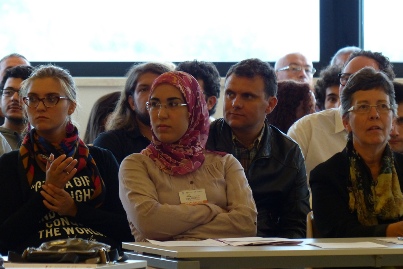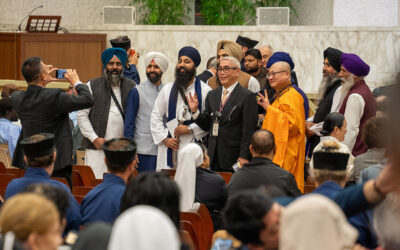 Three halls linked together, 3000 people and live streaming – these things show the tremendous sense of expectation caused by the launch of a book-long interview with the Focolare Movement’s President, Maria Voce. She gave a full response to questions across the board from the journalists Michele Zanzucchi and Paolo Lòriga (respectively the director and the chief editor of the twice monthly magazine Città Nuova). ‘What are the focolarini thinking after Chiara Lubich’s death? Are there progressives and conservatives? Do they seek positions of influence in the Church and in politics? Are they just superficial “hail fellow well met” types who smile too much?’ The title of the book, La scommesa di Emmaus, translates as Emmaus’s Challenge. It was previewed and presented on 22 September in a conversation between the Focolare President and Lucetta Scaraffia (historian and leader writer for the Osservatore Romano) and Marco Politi (author and leader writer for Il Fatto Quotidiano). Scaraffia and Politi were eager to grasp the opportunity of speaking with Maria Voce in person and the interview ranged over the most varied topics: how the Movement can cope with developing a public image after a period of going unnoticed; the need for the Focolare to be involved with big issues such as the promotion of the laity; ecumenism; inter-religious dialogue and dialogue with people with non-religious convictions; women; euthanasia; the family; work; Muslims in Europe; Chiara Lubich’s charism as a woman seen as a gift for the Church; the diminishing number of focolarini making a radical life choice in comparison with the numbers of people in the whole of the Movement; and still more items.
Three halls linked together, 3000 people and live streaming – these things show the tremendous sense of expectation caused by the launch of a book-long interview with the Focolare Movement’s President, Maria Voce. She gave a full response to questions across the board from the journalists Michele Zanzucchi and Paolo Lòriga (respectively the director and the chief editor of the twice monthly magazine Città Nuova). ‘What are the focolarini thinking after Chiara Lubich’s death? Are there progressives and conservatives? Do they seek positions of influence in the Church and in politics? Are they just superficial “hail fellow well met” types who smile too much?’ The title of the book, La scommesa di Emmaus, translates as Emmaus’s Challenge. It was previewed and presented on 22 September in a conversation between the Focolare President and Lucetta Scaraffia (historian and leader writer for the Osservatore Romano) and Marco Politi (author and leader writer for Il Fatto Quotidiano). Scaraffia and Politi were eager to grasp the opportunity of speaking with Maria Voce in person and the interview ranged over the most varied topics: how the Movement can cope with developing a public image after a period of going unnoticed; the need for the Focolare to be involved with big issues such as the promotion of the laity; ecumenism; inter-religious dialogue and dialogue with people with non-religious convictions; women; euthanasia; the family; work; Muslims in Europe; Chiara Lubich’s charism as a woman seen as a gift for the Church; the diminishing number of focolarini making a radical life choice in comparison with the numbers of people in the whole of the Movement; and still more items.  Maria Voce seemed to feel she was in her own living room with a couple of friends. She was unruffled and replied without hesitation and with clarity: ‘We are not suffering the sickness of trying to hide ourselves, we just don’t think it important to seek publicity for ourselves. We would prefer, in fact, people to get to know whatever positive things we manage to inject into human affairs. As Maria Voce I don’t feel that I have significant things to say, but as the Focolare Movement I do.’ ‘Lay people don’t need encouragement, rather they need to be left free to act in the Church context with greater trust,’ she says in the book. This statement, particularly appreciated by Scaraffia, was the basis for reflecting upon the laity and upon women: ‘Chiara liked to say that women have, as their specific characteristic, a greater capacity for loving and suffering. This is seen most clearly in motherhood. And so I would say that women have, in a particular way, the capacity to build the family…. In a Church that wishes to be more and more a family, to be communion, the summary of all the aspirations of humanity, women have an important role. But, as Chiara always said, I am convinced that women and men are equally responsible before God. In the Gospel it is written: ‘There is neither man nor woman, neither Jew nor Greek’ and so the important thing is that both women and men should become what they should be, that is, Christ in the Church.’ After a musical break Marco Politi suggested that ‘a focolare of dialogue’ (that is, a space to discuss in the spirit of the Focolare) should be set up. Here there would be the possibility of reflecting regularly upon the big questions. Maria Voce fired back, ‘This is a challenge more than a question. It would be more in keeping with our style, our way of doing things, because it wouldn’t be so much sharing big ideas together, but experiences, as has been done lately, for instance, in the two-day “LoppianoLab”. The witness we would like to give is of our relationship with the person next to us, not with great systems of thought.’
Maria Voce seemed to feel she was in her own living room with a couple of friends. She was unruffled and replied without hesitation and with clarity: ‘We are not suffering the sickness of trying to hide ourselves, we just don’t think it important to seek publicity for ourselves. We would prefer, in fact, people to get to know whatever positive things we manage to inject into human affairs. As Maria Voce I don’t feel that I have significant things to say, but as the Focolare Movement I do.’ ‘Lay people don’t need encouragement, rather they need to be left free to act in the Church context with greater trust,’ she says in the book. This statement, particularly appreciated by Scaraffia, was the basis for reflecting upon the laity and upon women: ‘Chiara liked to say that women have, as their specific characteristic, a greater capacity for loving and suffering. This is seen most clearly in motherhood. And so I would say that women have, in a particular way, the capacity to build the family…. In a Church that wishes to be more and more a family, to be communion, the summary of all the aspirations of humanity, women have an important role. But, as Chiara always said, I am convinced that women and men are equally responsible before God. In the Gospel it is written: ‘There is neither man nor woman, neither Jew nor Greek’ and so the important thing is that both women and men should become what they should be, that is, Christ in the Church.’ After a musical break Marco Politi suggested that ‘a focolare of dialogue’ (that is, a space to discuss in the spirit of the Focolare) should be set up. Here there would be the possibility of reflecting regularly upon the big questions. Maria Voce fired back, ‘This is a challenge more than a question. It would be more in keeping with our style, our way of doing things, because it wouldn’t be so much sharing big ideas together, but experiences, as has been done lately, for instance, in the two-day “LoppianoLab”. The witness we would like to give is of our relationship with the person next to us, not with great systems of thought.’  On the ‘question of the construction of mosques, for example, I believe that the most important thing is that Muslims feel they are welcomed and understood by Christians also in their way of expressing their religious life.’ Maria Voce continued saying that the Movement does indeed think about the big questions, according to its own style, which brings people together, in a living experience. ‘For instance, in a school, in a hospital, people from the Movement get together and they share their experiences of doing things in a Christian manner. From life itself there comes about a reflection that generates the specific initiatives to be taken together and an outline of the thinking behind them that can then also be offered.’ ‘The charism in itself has the answers. The questions change according to the times. New questions demand new ways for formulating the answers which, nonetheless, are present in the charism.’ On ecumenism: ‘I believe it is a difficult journey. It’s shameful for all Christians to be divided. If we are aware of it, we suffer. And all of us sharing in the same suffering cannot but make us do what is needed to overcome the division. Like this it is possible that steps towards unity, despite the effort, will be made. To reach unity it is necessary, for all of us, to know how to lose things, and this costs. We believe that the Movement’s role is precisely to put itself into the crack of this division.’ ‘We must keep on the journey! I believe it is something we all have to search for together.’ On the small number of focolarini: ‘Precisely because it is a radical choice, being consumed in unity – which means loving one another, losing oneself completely in the other, so that God may be among us – is a demanding choice and not everyone is called to it, even if the choice of God is made by everyone in the Movement.’ And in conclusion: ‘What interests us is that the idea of universal brotherhood should progress. It is God who guides history, so we shouldn’t be afraid.’ The hour passed in a moment. Among the three of the stage and the 3000 in the hall a sympathy had been built up and no one wanted to disturb. But by this time ‘Emmaus’s challenge’ had been offered and had been accepted.
On the ‘question of the construction of mosques, for example, I believe that the most important thing is that Muslims feel they are welcomed and understood by Christians also in their way of expressing their religious life.’ Maria Voce continued saying that the Movement does indeed think about the big questions, according to its own style, which brings people together, in a living experience. ‘For instance, in a school, in a hospital, people from the Movement get together and they share their experiences of doing things in a Christian manner. From life itself there comes about a reflection that generates the specific initiatives to be taken together and an outline of the thinking behind them that can then also be offered.’ ‘The charism in itself has the answers. The questions change according to the times. New questions demand new ways for formulating the answers which, nonetheless, are present in the charism.’ On ecumenism: ‘I believe it is a difficult journey. It’s shameful for all Christians to be divided. If we are aware of it, we suffer. And all of us sharing in the same suffering cannot but make us do what is needed to overcome the division. Like this it is possible that steps towards unity, despite the effort, will be made. To reach unity it is necessary, for all of us, to know how to lose things, and this costs. We believe that the Movement’s role is precisely to put itself into the crack of this division.’ ‘We must keep on the journey! I believe it is something we all have to search for together.’ On the small number of focolarini: ‘Precisely because it is a radical choice, being consumed in unity – which means loving one another, losing oneself completely in the other, so that God may be among us – is a demanding choice and not everyone is called to it, even if the choice of God is made by everyone in the Movement.’ And in conclusion: ‘What interests us is that the idea of universal brotherhood should progress. It is God who guides history, so we shouldn’t be afraid.’ The hour passed in a moment. Among the three of the stage and the 3000 in the hall a sympathy had been built up and no one wanted to disturb. But by this time ‘Emmaus’s challenge’ had been offered and had been accepted.
See everyone kindly
See everyone kindly




0 Comments